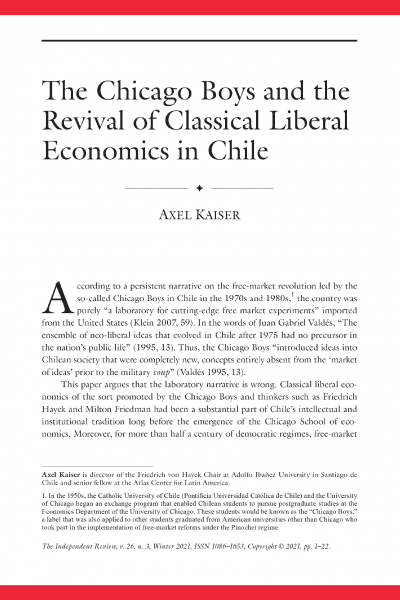
According to a persistent narrative on the free-market revolution led by the so-called Chicago Boys in Chile in the 1970s and 1980s,1 the country was purely “a laboratory for cutting-edge free market experiments” imported
from the United States (Klein 2007, 59). In the words of Juan Gabriel Valdés, “The ensemble of neo-liberal ideas that evolved in Chile after 1975 had no precursor in the nation’s public life” (1995, 13). Thus, the Chicago Boys “introduced ideas into Chilean society that were completely new, concepts entirely absent from the ‘market of ideas’ prior to the military coup” (Valdés 1995, 13).
This paper argues that the laboratory narrative is wrong. Classical liberal eco- nomics of the sort promoted by the Chicago Boys and thinkers such as Friedrich Hayek and Milton Friedman had been a substantial part of Chile’s intellectual and institutional tradition long before the emergence of the Chicago School of eco- nomics. Moreover, for more than half a century of democratic regimes, free-market economics was the most accepted economic philosophy by Chile’s political and intel- lectual elites. To a large extent, this acceptance was due to the in uence of French classical liberal economist Jean Gustave Coucelle-Seneuil. Another decisive and last- ing classical liberal in uence was the Venezuelan-born intellectual Andrés Bello, who is arguably the most prominent thinker in Chile’s history. A follower of Adam Smith and the Scottish Enlightenment, Bello created a system of private law in Chile2— along the lines of free-market philosophies—that has endured until this day.
DESCARGAR«La libertad es un derecho humano fundamental,
sin él no hay vida digna»